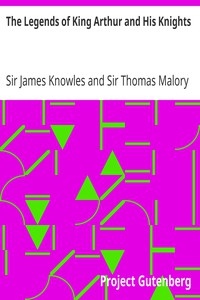Le Morte d'Arthur: Volume 2, Sir Thomas Malory [best pdf reader for ebooks .TXT] 📗

- Author: Sir Thomas Malory
Book online «Le Morte d'Arthur: Volume 2, Sir Thomas Malory [best pdf reader for ebooks .TXT] 📗». Author Sir Thomas Malory
Then looked Launcelot up to the heaven, and him seemed the clouds did open, and an old man came down, with a company of angels, and alighted among them, and gave unto everych his blessing, and called them his servants, and good and true knights. And when this old man had said thus he came to one of those knights, and said: I have lost all that I have set in thee, for thou hast ruled thee against me as a warrior, and used wrong wars with vain-glory, more for the pleasure of the world than to please me, therefore thou shalt be confounded without thou yield me my treasure. All this advision saw Sir Launcelot at the Cross.
And on the morn he took his horse and rode till mid-day; and there by adventure he met with the same knight that took his horse, helm, and his sword, when he slept when the Sangreal appeared afore the Cross. When Sir Launcelot saw him he saluted hin not fair, but cried on high: Knight, keep thee, for thou hast done to me great unkindness. And then they put afore them their spears, and Sir Launcelot came so fiercely upon him that he smote him and his horse down to the earth, that he had nigh broken his neck. Then Sir Launcelot took the knight’s horse that was his own aforehand, and descended from the horse he sat upon, and mounted upon his own horse, and tied the knight’s own horse to a tree, that he might find that horse when that he was arisen. Then Sir Launcelot rode till night, and by adventure he met an hermit, and each of them saluted other; and there he rested with that good man all night, and gave his horse such as he might get. Then said the good man unto Launcelot: Of whence be ye? Sir, said he, I am of Arthur’s court, and my name is Sir Launcelot du Lake that am in the quest of the Sangreal, and therefore I pray you to counsel me of a vision the which I had at the Cross. And so he told him all.
How the hermit expounded to Sir Launcelot his advision, and told him that Sir Galahad was his son.
Lo, Sir Launcelot, said the good man, there thou mightest understand the high lineage that thou art come of, and thine advision betokeneth. After the passion of Jesu Christ forty year, Joseph of Aramathie preached the victory of King Evelake, that he had in the battles the better of his enemies. And of the seven kings and the two knights: the first of them is called Nappus, an holy man; and the second hight Nacien, in remembrance of his grandsire, and in him dwelled our Lord Jesu Christ; and the third was called Helias le Grose; and the fourth hight Lisais; and the fifth hight Jonas, he departed out of his country and went into Wales, and took there the daughter of Manuel, whereby he had the land of Gaul, and he came to dwell in this country. And of him came King Launcelot thy grandsire, the which there wedded the king’s daughter of Ireland, and he was as worthy a man as thou art, and of him came King Ban, thy father, the which was the last of the seven kings. And by thee, Sir Launcelot, it signifieth that the angels said thou were none of the seven fellowships. And the last was the ninth knight, he was signified to a lion, for he should pass all manner of earthly knights, that is Sir Galahad, the which thou gat on King Pelles’ daughter; and thou ought to thank God more than any other man living, for of a sinner earthly thou hast no peer as in knighthood, nor never shall be. But little thank hast thou given to God for all the great virtues that God hath lent thee. Sir, said Launcelot, ye say that that good knight is my son. That oughtest thou to know and no man better, said the good man, for thou knewest the daughter of King Pelles fleshly, and on her thou begattest Galahad, and that was he that at the feast of Pentecost sat in the Siege Perilous; and therefore make thou it known openly that he is one of thy begetting on King Pelles’ daughter, for that will be your worship and honour, and to all thy kindred. And I counsel you in no place press not upon him to have ado with him. Well, said Launcelot, meseemeth that good knight should pray for me unto the High Father, that I fall not to sin again. Trust thou well, said the good man, thou farest mickle the better for his prayer; but the son shall not bear the wickedness of the father, nor the father shall not bear the wickedness of the son, but everych shall bear his own burden. And therefore beseek thou only God, and He will help thee in all thy needs. And then Sir Launcelot and he went to supper, and so laid him to rest, and the hair pricked so Sir Launcelot’s skin which grieved him full sore, but he took it meekly, and suffered the pain. And so on the morn he heard his mass and took his arms, and so took his leave.
How Sir Launcelot jousted with many knights, and how he was taken.
And then mounted upon his horse, and rode into a forest, and held no highway. And as he looked afore him he saw a fair plain, and beside that a fair castle, and afore the castle were many pavilions of silk and of diverse hue. And him seemed that he saw there five hundred knights riding on horseback; and there were two parties: they that were of the castle were all on black horses and their trappings black, and they that were without were all on white horses and trappings, and everych hurtled to other that it marvelled Sir Launcelot. And at the last him thought they of the castle were put to the worse.
Then thought Sir Launcelot for to help there the weaker party in increasing of his chivalry. And so Sir Launcelot thrust in among the party of the castle, and smote down a knight, horse and man, to the earth. And then he rashed here and there, and did marvellous deeds of arms. And then he drew out his sword, and struck many knights to the earth, so that all those that saw him marvelled that ever one knight might do so great deeds of arms.
But always the white knights held them nigh about Sir Launcelot, for to tire him and wind him. But at the last, as a man may not ever endure, Sir Launcelot waxed so faint of fighting and travailing, and was so weary of his great deeds, but he might not lift up his arms for to give one stroke, so that he weened never to have borne arms; and then they all took and led him away into a forest, and there made him to alight and to rest him.
And then all the fellowship of the castle were overcome for the default of him.
Then they said all unto Sir Launcelot: Blessed be God that ye be now of our fellowship, for we shall hold you in our prison; and so they left him with few words.
And then Sir Launcelot made great sorrow, For never or now was I never at tournament nor jousts but I had the best, and now I am shamed; and then he said: Now I am sure that I am more sinfuller than ever I was.
Thus he rode sorrowing, and half a day he was out of despair, till that he came into a deep valley. And when Sir Launcelot saw he might not ride up into the mountain, he there alighted under an apple tree, and there he left his helm and his shield, and put his horse unto pasture. And then he laid him down to sleep. And then him thought there came an old man afore him, the which said: Ah, Launcelot of evil faith and poor belief, wherefore is thy will turned so lightly toward thy deadly sin? And when he had said thus he vanished away, and Launcelot wist not where he was become. Then he took his horse, and armed him; and as he rode by the way he saw a chapel where was a recluse, which had a window that she might see up to the altar. And all aloud she called Launcelot, for that he seemed a knight errant. And then he came, and she asked him what he was, and of what place, and where about he went to seek.
How Sir Launcelot told his advision to a woman, and how she expounded it to him.
And then he told her altogether word by word, and the truth how it befell him at the tournament. And after told her his advision that he had had that night in his sleep, and prayed her to tell him what it might mean, for he was not well content with it. Ah, Launcelot, said she, as long as ye were knight of earthly knighthood ye were the most marvellous man of the world, and most adventurous. Now, said the lady, sithen ye be set among the knights of heavenly adventures, if adventure fell thee contrary at that tournament have thou no marvel, for that tournament yesterday was but a tokening of Our Lord. And not for then there was none enchantment, for they at the tournament were earthly knights. The tournament was a token to see who should have most knights, either Eliazar, the son of King Pelles, or Argustus, the son of King Harlon. But Eliazar was all clothed in white, and Argustus was covered in black, the which were [over]come.
All what this betokeneth I shall tell you. The day of Pentecost, when King Arthur held his court, it befell that earthly kings and knights took a tournament together, that is to say the quest of the Sangreal. The earthly knights were they the which were clothed all in black, and the covering betokeneth the sins whereof they be not confessed. And they with the covering of white betokeneth virginity, and they that chose chastity. And thus was the quest begun in them. Then thou beheld the sinners and the good men, and when thou sawest the sinners overcome, thou inclinest to that party for bobaunce and pride of the world, and all that must be left in that quest, for in this quest thou shalt have many fellows and thy betters. For thou art so feeble of evil trust and good belief, this made it when thou were there where they took thee and led thee into the forest. And anon there appeared the Sangreal unto the white knights, but thou was so feeble of good belief and faith that thou mightest not abide it for all the teaching of the good man, but anon thou turnest to the sinners, and that caused thy misadventure that thou should’st know good from evil and vain glory of the world, the which is not worth a pear. And for great pride thou madest great sorrow that thou hadst not overcome all the white knights with the covering of white, by whom was betokened virginity and chastity; and therefore God was wroth with you, for God loveth no such deeds in this quest. And this advision signifieth that thou were of evil faith and of poor belief, the which will make thee to fall into the deep pit of hell if thou keep thee not. Now have I warned thee of thy vain glory and of thy pride, that thou hast many times erred against thy Maker. Beware of everlasting pain, for of all earthly knights I have most pity of thee, for I know well thou hast not thy peer of any earthly sinful man.
And so she commended Sir Launcelot to dinner. And





Comments (0)